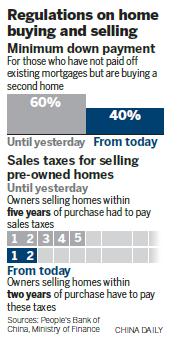


Wang Jun, a senior economist at the China Center for International Economic Exchanges, a government think tank, said, "The real estate market should remain healthy and stable, as it is still one of the strongest driving forces for the economy."
Wang said the measures had been released before the National Bureau of Statistics' first-quarter economic data reports next week.
According to the bureau, the number of cities with month-on-month price falls among the 70 tracked by the government rose in February to 66 from 64, after falling for three consecutive months.
Meanwhile, industrial output, fixed-asset investment and retail sales retreated to multiyear lows in the first two months of the year, suggesting more policy easing is needed to boost the economy.
Analysts said lowering the down payment requirement will support growing demand for better housing, benefiting the property market. For example, the down payment on a 90-square-meter apartment in central Shanghai under the previous policy was about 3.78 million yuan ($616,000). It is now 2.11 million yuan.
Regina Yang, director and head of research at Knight Frank Shanghai, said the move will further liberalize the property market and help to support homebuyers' demands for better housing conditions.
Financial institutions predict that the consumer product index, a main gauge of inflation, may continue to ease in March from 1.4 percent in February.
Jiang Xueqing contributed to this story.
 |
 J-11 fighters in air exercise
J-11 fighters in air exercise Beauties dancing on the rings
Beauties dancing on the rings Attendants-to-be join Mr. & Miss Campus Contest
Attendants-to-be join Mr. & Miss Campus Contest Beijing's toughest anti-smoking law takes effect
Beijing's toughest anti-smoking law takes effect Family lives in cave for about 50 years in SW China
Family lives in cave for about 50 years in SW China PLA soldiers operating vehicle-mounted guns in drill
PLA soldiers operating vehicle-mounted guns in drill Blind carpenter in E China's Jiangxi
Blind carpenter in E China's Jiangxi China hosts overseas disaster relief exercise for the first time
China hosts overseas disaster relief exercise for the first time 20 pairs of twins who will become flight attendants in Sichuan
20 pairs of twins who will become flight attendants in Sichuan Obama is sowing discontent in S.China Sea
Obama is sowing discontent in S.China Sea Rescuers work through night to reach cruise ship survivors
Rescuers work through night to reach cruise ship survivors Driving through limbo
Driving through limbo Facing down MERS
Facing down MERSDay|Week